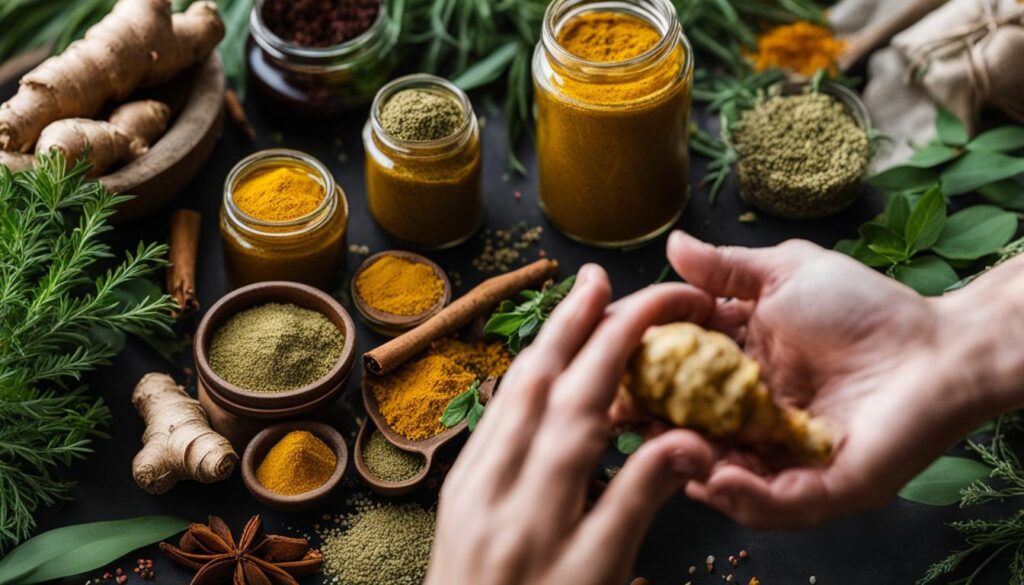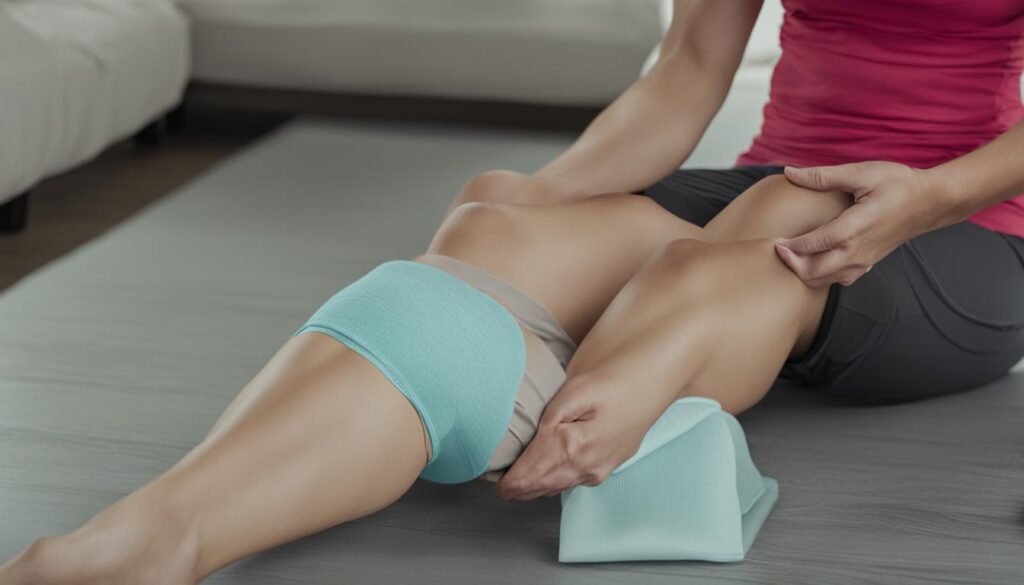Welcome to your go-to guide for muscle spasm remedies. Navigating through the uncomfortable journey of muscle spasms can be a daunting task, but we’re here to simplify it for you. Whether you’re seeking relief from a sudden, involuntary contraction of your muscles, or looking to understand the array of treatments available, we’ve got you covered. In this article, we’ll dive into various muscle spasm remedies, advocating both medical treatments and natural solutions to offer you respite from this common issue.
Incorporating a set of muscle spasm remedies at home can genuinely make a difference in managing your discomfort and enhancing your overall quality of life. We’ll also provide insights into muscle spasm treatment options that extend beyond your home to clinics and healthcare centers. To top it all off, we’ll introduce you to certain natural remedies for muscle spasms that have stood the test of time, offering a more holistic approach to muscle health.
Key Takeaways
- Muscle spasms are sudden, involuntary contractions of the muscles that can cause significant discomfort.
- Multiple remedies at home can help manage these spasms, spanning from basic stretching techniques to specific workouts.
- For persistent or severe spasms, medical treatments and consultations are crucial.
- Natural remedies for muscle spasms, while not always backed by scientific evidence, can still provide genuine relief.
- Preventive strategies and certain lifestyle changes, like proper hydration and regular exercise, can significantly lower the risk of muscle spasms.
- Different muscle spasm treatments suit diverse individuals; exploring a variety of options can help find the most effective approach for you.
- Professional medical advice is essential when muscle spasms are frequent, debilitating, or disrupt your routine.
Understanding Muscle Spasms and Their Triggers
It’s crucial to grasp the factors leading to muscle spasms to prevent, reduce, or alleviate muscle spasms. The primary reasons vary from basic muscle fatigue to deeper medical conditions. Let’s take an in-depth look at them.
Common Causes of Muscle Cramps
Muscle cramps are usually a result of muscle fatigue, dehydration, and electrolyte imbalances. Deficiencies in vital minerals like calcium, magnesium, potassium, and sodium, often trigger these spasms. However, certain medications and health conditions such as diabetes, Parkinson’s disease, or pregnancy can also cause muscle spasms.
Symptoms and Signs of a Muscle Spasm
A muscle spasm can be as subtle as a twitch or a knot-like feeling in the affected area. However, in severe cases, these spasms can cause significant, debilitating pain, making it difficult to ignore. Recognizing these signs can help identify and address muscle spasms before they escalate.
Populations at Higher Risk for Muscle Cramps
Anyone can experience a muscle spasm, but certain population segments are more prone to them. They include individuals in their older years, pregnant women, females during their menstruation period, and people with nerve disorders. These groups may benefit from preventative strategies to decrease the occurrence of spasms.
Muscle Spasm Remedies
Various methods are available for managing and treating muscle spasms and cramps. In most cases, home remedies can provide immediate relief from discomfort and aid in preventing future occurrences. Key strategies include things like stretching techniques, massage, and maintaining proper hydration.
Stretching Techniques for Immediate Relief
One of the simplest yet most effective muscle spasms relief techniques is stretching the affected muscle group. Stretching can tamp down the sudden and involuntary muscle contractions that characterize cramps.
- For calf muscle cramps, push your weight onto the affected leg and slightly bend the knee. For better balance, lean your hands against a wall.
- For thigh cramps, holding onto something for support, flex the affected leg’s knee and grab the same-side ankle, pulling it towards the buttock.
- For back spasms, lying down flat and pulling the knees towards the chest can offer relief.
- For neck spasms, gentle neck rotations help to stretch and relax the muscles.
Massage as a Remedy for Muscle Cramps
Massages serve as a great muscle cramp remedy. Massaging the cramp-affected muscle can help to relax the muscle and potentially provide relief from the pain and discomfort. Gentle rubbing in tandem with stretching can yield even better results.
The Role of Hydration in Muscle Spasm Relief
Maintaining proper hydration can play a crucial role in preventing and managing muscle cramps. The adequate water intake recommended for each person may differ according to factors such as gender, age, physical activity level, and climatic conditions. Consuming electrolytes – mainly found in sports drinks – can also restore the electrolyte imbalance in your body, thereby ensuring proper muscle function and preventing muscle spasms. In doing so, this serves as an effective muscle spasm home remedy.
By implementing these easy-to-apply strategies, you can readily manage and possibly prevent future muscle spasms from disrupting your daily life.

Alternative approaches have always found a place in health and wellness circles. In the context of muscle spasms, some of these natural remedies, combined with mild exercises and topical applications, can offer relief. Let’s delve into these viable options.
The Importance of Mild Exercise
Staying active is a fundamental aspect of maintaining good health, and this holds true when it comes to relieving muscle cramps. Light exercises, such as jogging in place, walking, or using a stationary bike before bedtime, may help alleviate night leg cramps. A simple routine can improve blood circulation to your muscles, keeping spasms at bay.
Home Ingredients for Spasm Relief
Certain kitchen staples have been touted for their potential benefits against muscle cramps. An ingredient to consider is pickle juice, renowned in athletic communities for quick cramp relief, possibly due to its vinegar content. Another known remedy includes supplements like vitamin B-12 and magnesium, minerals essential for muscle function.
| Home Ingredient | Potential Benefit |
|---|---|
| Pickle Juice | Provides a quick relief from cramps potentially due to its vinegar content |
| Magnesium Supplements | Supports muscle function and relaxation |
| Vitamin B-12 Supplements | Contributes to overall nerve function |
Topical Creams and Their Benefits
Topical creams, particularly those containing anti-inflammatory and pain-relieving substances, have long been employed as muscle spasm treatments. These creams often include ingredients like lidocaine, camphor, menthol, and capsaicin for pain relief. In addition, some creams feature natural ingredients like curcuma longa and celery seed, known for their anti-inflammatory properties.
Note that while these remedies can provide temporary relief, they don’t address underlying medical conditions that can cause chronic muscle spasms. Always consult a healthcare professional if your symptoms persist or worsen.
Preventive Strategies and Lifestyle Changes
Prevention is always better than cure, especially when dealing with muscle cramps. Making simple adjustments in your diet and lifestyle can greatly help to prevent muscle cramps and maintain your muscle health.
Dietary Adjustments for Spasm Prevention
Good nutrition plays a vital role in maintaining our overall health, including our muscles. Dietary adjustments that prioritize foods rich in necessary minerals like calcium, potassium, and magnesium can significantly boost muscle health. Here are some beneficial dietary tips for muscle health:
- Include foods rich in calcium like dairy products and green leafy vegetables in your daily diet.
- Opt for potassium-rich foods like bananas and avocados.
- Magnesium can be found in whole grains, nuts, and seeds.
- Drinking plenty of water and staying hydrated can help prevent muscle cramps.
Regular Physical Activity and Its Impact on Muscle Health
Regular physical activity is another key factor in avoiding muscle cramps. Exercise aids in improving circulation, preparing our muscles for exertion and reducing the risk of cramps. Moreover, routine exercise can enhance muscle strength and flexibility, making them less susceptible to spasming.
It is also important to remember to warm up before starting any intense physical activity. This can prep your muscles for the activity ahead and lessen the likelihood of muscle cramp occurrence. Consider exercises with low impact like swimming or cycling. These can be beneficial for those prone to leg cramps.
If muscle cramps frequently disrupt sleep or daily activities, it might be worthwhile to consult a healthcare provider. They may recommend exercise for muscle cramps, muscle relaxant medication, or add on specific stretches to your routine tailored to prevent cramps.
Conclusion
As we delve into the world of muscle spasm remedies, it becomes evident that while there are numerous strategies for managing muscle cramps, understanding when to employ them and when to seek professional muscle spasm treatment is just as crucial. Not all spasms can be effectively mitigated at home, and some may signal a deeper issue warranting medical attention. Let’s take a look at instances when professional advice may be necessary, and understand how recurrent muscle spasms can be managed for long-term relief.
When to Seek Professional Medical Advice
If muscle spasms persist despite self-care measures, or if they are severe and debilitating, seeking medical advice is recommended. The process of diagnosis may encompass physical examinations, blood tests, and investigations to determine any underlying causes for the cramps. It is essential for individuals to understand that while home remedies may offer temporary solace, they might not address the fundamental issue causing the spasms. Therefore, considering a healthcare provider’s guidance can be a crucial step towards restorative wellness.
Long-Term Management of Recurrent Muscle Spasms
For those who experience recurrent muscle spasms, long-term management strategies may be necessary. This might involve a targeted exercise regime prescribed by a physical therapist. Alternatively, certain medications may also be recommended to manage the spasms. Furthermore, considering alternative therapies for comprehensive, customized care may provide added relief. Remember, managing muscle cramps effectively requires understanding the individual’s unique needs, tolerance, and response to different treatments.





